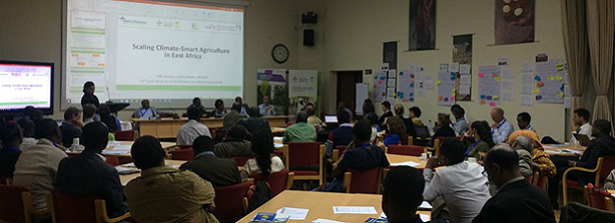Scaling climate-smart agriculture in East Africa: A role for all stakeholders taking into account contexts and needs

For food systems and agricultural livelihoods in Eastern Africa to truly be climate-resilient and low in emissions, climate-smart agriculture (CSA) policies, practices and perspectives must be scaled. To move this forward, the CGIAR Research Program on Climate Change, Agriculture and Food Security (CCAFS) in East Africa, NWO-WOTRO, the Food & Business Knowledge Platform (F&BKP) and AgriProFocus Ethiopia hosted a public dialogue, on June 13 in Addis Ababa at the International Livestock Research Institute Campus.
The event was organized at the occasion of the midterm of the Global Challenges Programme (GCP) Call 4, consisting of eight research projects that work via research on practical solutions for scaling CSA, from Sustainable business models in dairy chains to Scaling climate-smart nutrient management tools and Citizen’s Science for climate smart nutritious varieties. The afternoon started with a series of presentations of GCP-4 stakeholders. Thereafter, practical views from experts of private, research and civil sectors were presented by a panel and discussed with the audience from multiple disciplines and sectors.
Scaling CSA practices: Creating a storm via champions at various positions in the system
Bruce Campbell, Director of CCAFS, presented key contemporary challenges at the nexus of the climate crisis and food systems. This included a deadline of 11 growing seasons for 55 million farmers across Africa to become food secure, 250 million more urban residents to feed by 2030, and the urgent need for agricultural transformation.
Robert-Jan Scheer, Programme Committee Member of NWO-WOTRO as policy maker Strategy and Knowledge Management Africa Region at the Netherlands Ministry of Foreign Affairs, highlighted key dynamic aspects that are critical to scaling including adoption levels and approaches, adaptability to change, learning processes and challenge response tactics. “A storm is needed as actual institutions won’t do the job, we keep on making the same mistakes in established systems, so we have to find champions and become more practical.”
Sietze Vellema, associate professor at Wageningen University & Research, GCP-4 project leader of “Multiple pathways and inclusive low emission development” presented the process of understanding and doing scaling, derived from the GCP-4 projects midterm findings including: incorporating diverse actors; finding relevance between scaling and business realities; aligning CSA with local and country priorities; exploring opportunities for sharing and prototyping; creating space for feedback at multiple levels; and promoting inclusivity.
Jana Koerner, Scaling Expert with CCAFS, presented insights on the “art of scaling.” This included the human aspects of scaling including shifting mindsets, values and behaviours; principles that inspire scaling (e.g. 3 Thirds Principle, Iteration and Recalibration); the importance of comprehensive approaches for inclusive scaling; and using systems thinking as a guiding framework.
Helena Shilomboleni, CSA Scaling Specialist at CCAFS, presented on the role of ICTs in scaling up CSA innovations across Sub-Saharan Africa, highlighting diverse initiatives to roll out agriculture value added services and promote interactivity, while cautioning that structural factors influence the dynamics between ICTs and food security outcomes.
Jointly addressing challenging realities of CSA practices at scale
Hereafter as the second part of the afternoon Sarah Assefa, Country Network Facilitator for AgriProFocus Ethiopia, facilitated a panel discussion on the challenges and opportunities for adoption and scaling CSA.
Daniel Fikreyesus, Co-Founder and Manager of Echnoserve, a sustainable development, environmental and energy company highlighted their Yezare SMS technology which disseminates low cost climate and market information to farmers, using a human-centered approach across diverse agroecology zones of Ethiopia.
Iddo Dror, Program Leader of Impact at Scale at the International Livestock Research Institute (ILRI), emphasized that scaling targets must be significant, aiming to reach hundreds of thousands to millions of people, and apply approaches such as early intervention, economic viability tests, evaluation of management systems, and indicators for success, among others.
He was asked by the audience if management structures are needed that research institutes don’t have? On which he reacted by stating that indeed a change is needed and that response time lines should be 30 times faster, even as keeping track of all projects running.
Derese Teshome, Director of the Ethiopian Institute of Agricultural Research (EIAR), highlighted the vision of scaling as a process of modeling pathways for commercialization, testing working arrangements, and popularizing and promoting technologies for agricultural systems.
A participant asked after EIAR mechanisms for knowledge sharing. Mr. Teshome explained that knowledge provision helps to grow platforms beyond knowledge and technical capacities. And that there is a need to work on such modalities for dissemination so that knowledge can work for itself.
Asaye Asnake, Program Manager at Farm Africa, organization for practical support to Ethiopia’s farmers, defined scaling as a process of adapting best practices and approaches in a manner that is expansive and sustainable, involving piloting a project, engaging stakeholders across the value chain, setting an evidence base, disseminating best practices through hands-on approaches (e.g. farmer field days), applying ICT tools, and incorporating the findings of policy inputs.
Simegn Kuma, Women’s Economic Empowerment Program Officer at UN Women, presented on gender responsive and inclusive CSA scaling and how this process can best address gender gaps in food systems and promote social inclusion, including gender sensitive enabling environments, gendered training manuals and toolkits and specific social inclusion projects, among others.
In closing, the panelists and organizers emphasized the importance of the private sector in creating market-based incentives; research on technology options; incorporating gender at assessment inception; applying tools and theories for scaling; and harnessing multi-stakeholder platforms where possible.





